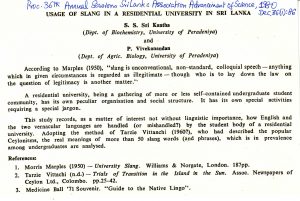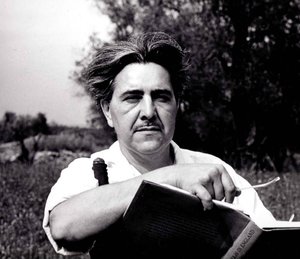Usage of Slang at the Peradeniya Campus in 1980
by Sachi Sri Kantha, February 5, 2021
A Presentation at the 36th Annual Sessions of SLAAS in 1980
Forty years have passed since I made a presentation on the usage of slang by the Peradeniya University undergraduates. The occasion was at the 36th Annual Sessions of the Sri Lanka Association for Advancement of Science, on Dec.15th, 1980. It was a joint study I did with P. Vivekanandan, my then roommate at the Arunachalam Hall, University of Peradeniya. For this study, we collected 66 slang words/phrases (in English, Sinhala and Tamil) used by the undergraduates and provided an analysis. Luckily, I have saved a copy in my files, and for the benefit of future researchers on linguistics in Sri Lanka, I present a pdf version. Usage of Slang at Peradeniya – 1980 Presentation

Gershon Legman
In Chapter 15, I had mentioned Gershon Legman (an American self-taught scholar of dirty jokes). He was indeed an inspiration for me to undertake this study of slang usage. A second inspiration was a two page book review by Alan Ferguson, which appeared in the Nature journal (Dec. 24, 1938), that I had glanced at the library. Ferguson had reviewed Eric Partridge’s 1,000 page tome, ‘A Dictionary of Slang and Unconventional English’.
I was strongly impressed by the second paragraph of this review, which I reproduce below verbatim.
“What is slang? We have somewhere to set a term to definition, and it may be assumed that everyone knows what is meant by standard English. Making this rather large assumption, we know also that there are deviations from the standard which are not to be classed as dialect – deviations which consist in substitutes, generally undignified, sometimes humorous, and sometimes coarse, ‘for those modes of expression which are employed by persons who value themselves on propriety of speech’. Such substitutes are, for the most part, slang, and the reasons for their introduction make as difficult a scientific problem as do the philological problems involved in the derivation of the words themselves.”

Eric Partridge
To my surprise this particular reviewer had suggested a ‘scientific problem’, and the review itself had appeared in the pages of Nature. Thus, I wished to expand my horizons as a scientist, in studying the slang usage.
As described previously in Chapter 15, time was at a premium for me to prepare this slang usage manuscript for publication in a peer reviewed journal, before I left for USA in August 1981. My then priority was to spend time in preparing 3 manuscripts (within 7 months) in my then primary research area (biochemistry and nutrition) for publication in Sri Lankan journals quickly. This particular goal, I was able to achieve. Those three papers were my early stepping stones for a career as a published scientist, with over 160 peer reviewed communications, and still counting. However, non-publication of this particular slang usage study in Sri Lanka, in a sociology or linguistics journal had remained as a regret for me. Thanks to ‘From Sachi’s File’ column, I’m pleased that I could retrieve my memory of this particular study, after 40 years.
Cited Sources:
Ferguson A. The science of slang. Nature, 1938; 142: 1095-1097.
Hettiarachchy NS, Thaha SZ, Sri Kantha S, Jeyasooriya R and Deen KJ. Nutrition survey of a rural Sri Lankan village: Bambarabedda (Kandy district). Jaffna Medical Journal, 1981; 16: 64-75.
Sri Kantha S and Hettiarachchy NS. Phytohemagglutinins in the winged bean, Psophocarpus tetragonolobus. Journal of National Science Council of Sri Lanka, 1981; 9: 223-228.
Hettiarachchy NS and Sri Kantha S. Trypsin inhibitor and phytohemagglutinin content of six legumes commonly consumed by Sri Lankans. Journal of National Science Council of Sri Lanka, 1981; 9: 269-272.
Sri Kantha S and Vivekanandan P. Usage of slang in a residential university in Sri Lanka. Proceedings of 36th Annual Sessions of Sri Lanka Association for Advancement of Science, Dec. 1980; 36(1): 86 (abstract).